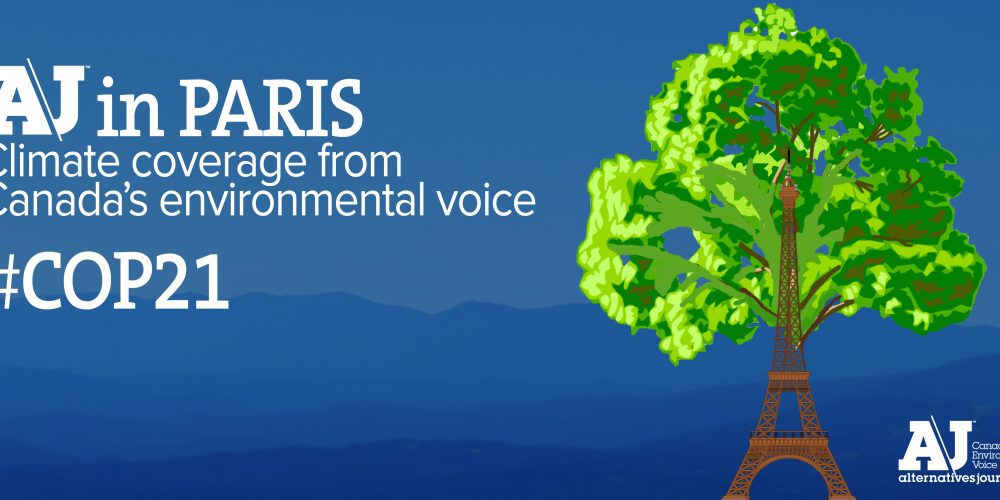The last time a major global climate agreement was on the table was at 2009’s COP15 in Copenhagen. The Copenhagen discussions failed to reach the expected agreement and were almost unanimously deemed a failure. The road to Paris, and a second chance at a substantive climate agreement, has not been easy. It has taken six years to rebuild the trust needed; and negotiate the details of the agreement that is expected to be signed at COP 21.
The last time a major global climate agreement was on the table was at 2009’s COP15 in Copenhagen. The Copenhagen discussions failed to reach the expected agreement and were almost unanimously deemed a failure. The road to Paris, and a second chance at a substantive climate agreement, has not been easy. It has taken six years to rebuild the trust needed; and negotiate the details of the agreement that is expected to be signed at COP 21.
Throughout this process, Canada has not played a constructive role in the negotiations, building a reputation for disrupting and even sabotaging the negotiations. After nearly a decade of climate inaction, Canada is not a strong presence at the negotiating table. After withdrawing from the Kyoto Protocol in 2011, Canada’s reputation abroad has only gone down, though its role has not been substantial since the Montreal Accord. Now at the eleventh hour Canada is looking to be at the table again after Trudeau’s victory in October.
Despite the current optimism in Canada around the change of government, they will not be adding any ambition to the submission made by the Harper government in May.
“We do have targets of our own, we have the target of the conservative government. As we’ve said, we are here in Pairs to negotiate an international framework. We understand that we need to come up with a new target and we’ve been very clear that we will do that within 90 days of Paris,” said Minister of Environment and Climate Change Catherine McKenna.
While the target found in the Intended Nationally Determined Contributions (INDC) were widely criticized, the fact that the new government is not updating them in time for Paris does not make or break for the negotiations. Just bringing a constructive attitude will be a large improvement for Canada.
The climate negotiations are a carefully orchestrated collection of multi-level negotiations. For the Paris agreement to be considered a success, each of these negotiation areas will need to succeed to some extent.
Here are some key issues to look for throughout the negotiations:
-
Finance: money will be an important part of the agreement. The Green Climate Fund has not been as successful as people hoped it will be, so developing countries will need reassurance that money will flow for adaptation and mitigation.
-
The 2 degrees target has been the target set since Copenhagen, but many of the most vulnerable countries need a reference to 1.5 degrees for the agreement to be acceptable to them.
-
How the INDCs are incorporated in the final agreement is a point of contention, will they be legally binding?
-
Perhaps one of the most important things to look for is if the Paris agreement implements a framework that pushes for increased ambition in coming years. Ideally a five-year cycle will be put in place to ensure countries are on-track with commitments and revving up ambition.
-
Language around phasing out of fossil fuels: will it be decarbonization (complete phasing out of fossil fuels) or carbon neutral (offsetting through carbon capture and storage)? Will they have a firm date or just a vague deadline?
-
Another key item for those countries that are vulnerable is loss and damage. They will need this to be mentioned in the Paris agreement for them to accept the deal. The real sticking point will be any reference to compensation.
COP21 will not solve climate change, so we should not expect it to. What it should do is ensure through a legally-binding agreement, that all countries are actively working towards preventing climate warming of more than 2 degrees. Canada’s role is to show up to the negotiating table, facilitate (rather than obstruct) a global agreement to make up for past years and do our fair share of the work in mitigating global climate change.
Andres Fuentes has been involved in international climate change policy since 2009. He currently writes for The Verb newswire service.
Andres Fuentes has been involved in international climate change policy since 2009. He currently writes for The Verb newswire service.
Megan is A\J’s editorial manager, a lover of journalism, and graduate of the University of Waterloo’s Faculty of Environment.












